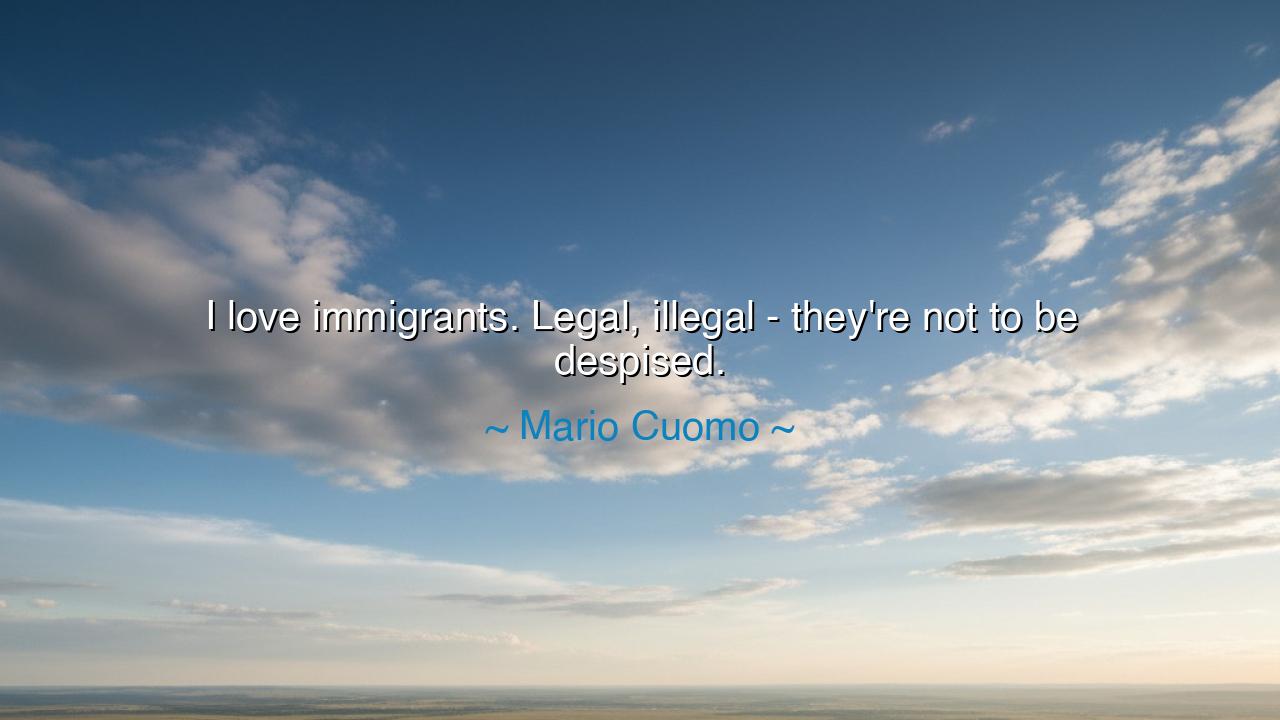
I love immigrants. Legal, illegal - they're not to be despised.






In the chronicles of human civilization, the movement of peoples has always been both a source of vitality and a test of compassion. Mario Cuomo’s words, “I love immigrants. Legal, illegal - they're not to be despised,” illuminate a profound moral truth: the worth of a human being is not determined by borders, documentation, or legal status, but by their shared humanity and capacity to contribute to society. Here lies a meditation on empathy, justice, and the enduring responsibility of communities to welcome and nurture those who seek refuge, opportunity, or a better life.
From the shores of ancient Athens to the bustling marketplaces of Renaissance Venice, societies have been enriched by the arrival of strangers. Merchants, scholars, and artisans brought knowledge, innovation, and culture, transforming cities into hubs of commerce and ideas. Yet in every era, newcomers faced suspicion and scorn. Cuomo’s reflection transcends this historical tension, asserting that immigrants, regardless of their legal standing, are not to be despised, but embraced as part of the moral and social fabric of a nation.
History provides a vivid example. In the late 19th and early 20th centuries, waves of immigrants arrived in the United States from Italy, Ireland, and Eastern Europe. Many were undocumented by modern standards, yet their labor, culture, and perseverance fueled the growth of cities and industry. Despite prejudice and hardship, these immigrants were indispensable to the nation’s development. Cuomo’s words echo this historical lesson: the humanity of the newcomer outweighs the bureaucratic distinctions imposed upon them.
Consider the story of a young Mexican farmworker who arrives without documentation, seeking opportunity for his family. He labors tirelessly in fields and orchards, contributing to the local economy, caring for his children, and integrating into the community. By any measure, his presence enhances the society that surrounds him. Cuomo’s declaration reminds us that legal status does not diminish the intrinsic value, dignity, or contributions of an individual, and that despising such a person is both morally and socially counterproductive.
The philosophical resonance of Cuomo’s words is profound: justice and compassion demand recognition of humanity above legal categories. Laws may govern behavior and define rights, but morality transcends regulation. The ancients recognized this principle in the treatment of strangers, sojourners, and exiles, often framing hospitality and protection of the outsider as a sacred duty. Cuomo’s insight aligns with this timeless ethic: the measure of a society is seen in how it treats the vulnerable and the newcomer.
The lesson extends beyond immigration alone. Communities thrive when they practice empathy, fairness, and inclusivity, recognizing the shared worth of every individual. By refusing to despise those who are different or who occupy precarious legal positions, society fosters cohesion, trust, and opportunity. Cuomo’s statement is a call to uphold these values, even amidst political or social debate.
Practically, this teaching calls for engagement, understanding, and advocacy. Support policies that protect human dignity, provide pathways for legal recognition, and welcome contributions from all members of society. Challenge prejudice and misinformation, and cultivate personal and communal empathy for those navigating hardship or displacement. By doing so, we honor both moral duty and the pragmatic benefits of inclusion.
Thus, Mario Cuomo’s words endure as a timeless admonition: love, respect, and embrace the immigrant, whether legal or undocumented, for their humanity is indivisible from our own. Let this reflection guide societies and individuals alike, reminding all that a nation’s strength lies not in the exclusion of strangers, but in the recognition, protection, and celebration of every human life that seeks to contribute to the common good.






AAdministratorAdministrator
Welcome, honored guests. Please leave a comment, we will respond soon